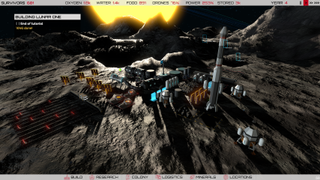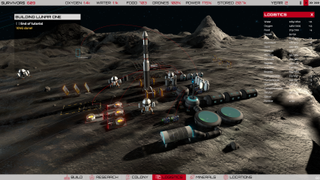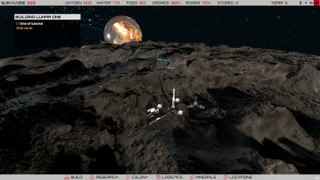Order of Magnitude is a colony simulation game from the makers of Prison Architect
Introversion tells us what it'd like to explore with its latest project.

Introversion's Prison Architect was a compelling simulation game that's generated some classic Chris Livingston diary features and continues to evolve years after a massively successful alpha release. In space building game Order of Magnitude, the scale of simulation is a lot grander, yet a similar principle applies of putting you in control of the environment for a group of people but not in direct control of the people themselves. Instead of a prison, you're in space, trying to ensure humanity survives after something terrible has happened to Earth. And instead of prisoners, you have entire colonies.
The game is in such an early state that Introversion co-founder Mark Morris seems reluctant to call it a full announcement. Hell, the game isn't even mentioned on Introversion's homepage right now. "We're nowhere near even having a launch date in mind for it at the moment," Morris told me at EGX Rezzed in London last week. "You can say this is an announcement, but it's more putting it out there, seeing what people think, just sending up a smoke signal and saying this is the kind of thing Introversion is working on now."
Order of Magnitude follows the studio's 'palate cleanser' Scanner Sombre. "It's obviously a space builder, and the high level concept is the Earth has been destroyed—meteor, planetary disaster, whatever. We haven't figured that out yet. You have to build a colony, probably on the moon, to reboot humanity to start off with. Initially, you've got to make sure that they've got oxygen, food, algae, that sort of thing, medicine, concrete to build the structures out of—trying to reboot the race from a very small number of people. We're not quite at that point yet."
Morris cautions me that they're not promising anything as they figure out the direction of the game, but he has plenty to say about what they'd like to explore. "From there, the hope is that you will go from a Moon base, or maybe a Mars base, or maybe an asteroid base—we're not certain—and scaling up potentially to a ship in orbit or a space station in orbit and start colonising other planets, the asteroid belt, that sort of thing. It's called Order of Magnitude because the long-term vision is potentially for you to be able to build enormous, stellar-scale constructs within the game. That's the scope that we're thinking of at the moment."
Hold up, though. None of that is in the game yet, which Morris is extremely clear about. "I need to be very careful with what I'm saying, because I'm not promising that's what we're going to deliver, but that's where we're heading. What we're trying to do is work out how to get there, work out what that's going to look like. I see a lot of parallels with Prison Architect."
At Rezzed, I play the game's tutorial which functions as a demo. I zoom in on the Moon, then build the core of my base. It's in 3D, and has colder-looking visuals than Prison Architect, which is no doubt deliberate given the subject matter. The buildings look more practical than fancy right now. I create solar panels to generate electricity and create resource-gathering plants that collect algae, which apparently functions as food for the colonists (Shake Shack this ain't). Little automated drones do the building work for you, and you select commands for mining constructs depending on what you want them to collect.

You can scan your surroundings for resources you might need, then place your buildings accordingly, and join your base up to new areas of the moon with communication towers. It's clearly in a super early state, but it does illustrate the planetary scale of the game pretty well, and after about 15 minutes I have a functioning colony up and running. With some accessibility-focused tweaks, this should be a solid base for Introversion to build upon, and Prison Architect's history suggests the developers can find plenty of ways to layer interesting systems on top of what's already here.
The biggest gaming news, reviews and hardware deals
Keep up to date with the most important stories and the best deals, as picked by the PC Gamer team.
"At the moment, we've only got the basics," says co-founder Chris Delay. "Our aim is to simulate on a colony level, on a society level. This is not like Prison Architect where every prisoner has their own mind, their own AI. You have hundreds, thousands of people in your colony, and a general model of how they're behaving. The Moon is where you start, it's like your refugee camp. It's been a very fast emergency evacuation from Earth, and the Moon is where you're going to build your refugee camp, your foothold, and then you'll expand out from there."
"If you've got one colony on the Moon and another on Mars, what might cause those colonies to stay coherent, stay together, what might cause them to break down into 'us and them'?" says Morris. "Trade wars, maybe war at some point. But at the moment we're not quite sure how to do that."
Morris seems particularly interested in the potential of human reactions in the game, and how the game can convey that. "If Prison Architect was about psychology and the psychology of the individual prisoners, I want Order of Magnitude to be about sociology and how the colony is functioning," he says. "A really interesting problem that emerges when you reboot the race is children, when you have them and how quickly you have them and how you look after them. If you don't get it right, what happens is your colonists age because they're desperately trying to be fed and watered, and they're too old to have children. Or they get really old, so you have an elderly population that can't fix anything, and then you've got a wave of nine year-olds. So you're fucked.
"The timeframe you're looking at from the start is 200-300 years, but of course you don't really know that as a player. Initially, you're trying to get the food and the water in, but on your next run, you'll realise, 'well if we're not having children by year two, this colony is not going to survive'. We're trying to work it out, but that's the level we're simulating it at."

Morris mentions the idea of simulating depression within the game. Your colony might survive for decades on algae with no windows, which isn't the best existence—you could face the consequences of building another oxygen plant, for example, when you could've improved your colonists' happiness with a communal area. Their well-being may determine the fate of your colony.
In theory, the game could explore these subjects, but again, these are very early days. "We haven't worked on the model and the game might not go in this way, but what would happen if you had two separate colonies, and you put water near one and you're building the water plant next to colony two?" Morris says. "Colony one decides to launch a raid on colony two because they've got water. If they'd done nothing, you'd have got the water up and running for colony two and everyone would've been fine. But because they weren't willing to wait, they've now gone over, killed half of your population and you're back to square one."
I immediately think of the Futurama episode Godfellas, where Bender floats through space playing god to a species of tiny people—until the people on Bender's ass declare war against the people living on his front, who are getting his full attention. "I like the idea of us exploring human beings being self-destructive, being 'us and them' and how 'us and them' comes about. A lot of the time with Prison Architect, we have to think, 'how is this system going to operate, how is the player going to know this is happening and what is the player going to be able to do about it?'"
Introversion throws out the idea of one day being able to simulate up to 1000 colonies. If Order of Magnitude goes in any of the directions that Morris discusses above, it'll hopefully have the capacity to create plenty of unpredictable stories as players try to fashion a future for humanity away from Earth, even when they fail spectacularly.
Most Popular

